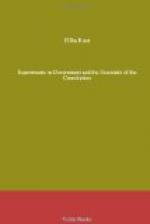A number of countries have copied our constitution coupled with a provision that the constitutional guarantees may be suspended in case of necessity. We are all familiar with the result. The guarantees of liberty and justice and order have been forgotten: the government is dictatorship and the popular will is expressed only by revolution.
Nor, so far as our national system is concerned has there yet appeared any reason to suppose that suitable laws to meet the new conditions cannot be enacted without either overriding or amending the constitution. The liberty of contract and the right of private property which are protected by the limitations of the constitution are held subject to the police power of government to pass and enforce laws for the protection of the public health, public morals, and public safety. The scope and character of the regulations required to accomplish these objects vary as the conditions of life in the country vary. Many interferences with contract and with property which would have been unjustifiable a century ago are demanded by the conditions which exist now and are permissible without violating any constitutional limitation. What will promote these objects the legislative power decides with large discretion, and the courts have no authority to review the exercise of that discretion. It is only when laws are passed under color of the police power and having no real or substantial relation to the purposes for which the power exists, that the courts can refuse to give them effect. By a multitude of judicial decisions in recent years our courts have sustained the exercise of this vast and progressive power in dealing with the new conditions of life under a great variety of circumstances. The principal difficulty in sustaining the exercise of the power has been caused ordinarily by the fact that carelessly or ignorantly drawn statutes either have failed to exhibit the true relation between the regulation proposed and the object sought, or have gone farther than the attainment of the legitimate object justified. A very good illustration of this is to be found in the Federal Employer’s Liability Act which was carelessly drawn and passed by Congress in 1906 and was declared unconstitutional by the Supreme Court, but which was carefully drawn and passed by Congress in 1908 and was declared constitutional by the same court.
Insistence upon hasty and violent methods rather than orderly and deliberate methods is really a result of impatience with the slow methods of true progress in popular government. We should probably make little progress were there not in every generation some men who, realizing evils, are eager for reform, impatient of delay, indignant at opposition, and intolerant of the long, slow processes by which the great body of the people may consider new proposals in all their relations, weigh their advantages and disadvantages, discuss their merits, and become educated either to their acceptance or rejection. Yet that is the method of progress in which no step, once taken, needs to be retraced; and it is the only way in which a democracy can avoid destroying its institutions by the impulsive substitution of novel and attractive but impracticable expedients.




